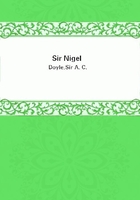
第56章
>From the hill of Weston Wood the travelers could see the long white band which dipped and curved and rose over the green downland, its course marked even in the hollows by the line of the old yew-trees which flanked it. Neither Nigel nor Aylward had wandered far from their own country, and now they rode with light hearts and eager eyes taking note of all the varied pictures of nature and of man which passed before them. To their left was a hilly country, a land of rolling heaths and woods, broken here and there into open spaces round the occasional farm-house of a franklin. Hackhurst Down, Dunley Hill, and Ranmore Common swelled and sank, each merging into the other. But on the right, after passing the village of Shere and the old church of Gomshall, the whole south country lay like a map at their feet. There was the huge wood of the Weald, one unbroken forest of oak-trees stretching away to the South Downs, which rose olive-green against the deep blue sky. Under this great canopy of trees strange folk lived and evil deeds were done. In its recesses were wild tribes, little changed from their heathen ancestors, who danced round the altar of Thor, and well was it for the peaceful traveler that he could tread the high open road of the chalk land with no need to wander into so dangerous a tract, where soft clay, tangled forest and wild men all barred his progress.
But apart from the rolling country upon the left and the great forest-hidden plain upon the right, there was much upon the road itself to engage the attention of the wayfarers. It was crowded with people. As far as their eyes could carry they could see the black dots scattered thickly upon the thin white band, sometimes single, sometimes several abreast, sometimes in moving crowds, where a drove of pilgrims held together for mutual protection, or a nobleman showed his greatness by the number of retainers who trailed at his heels. At that time the main roads were very crowded, for there, were many wandering people in the land. Of all sorts and kinds, they passed in an unbroken stream before the eyes of Nigel and of Aylward, alike only in the fact that one and all were powdered from their hair to their shoes with the gray dust of the chalk.
There were monks journeying from one cell to another, Benedictines with their black gowns looped up to show their white skirts, Carthusians in white, and pied Cistercians. Friars also of the three wandering orders - Dominicans in black, Carmelites in white and Franciscans in gray. There was no love lost between the cloistered monks and the free friars, each looking on the other as a rival who took from him the oblations of the faithful; so they passed on the high road as cat passes dog, with eyes askance and angry faces.
Then besides the men of the church there were the men of trade, the merchant in dusty broadcloth and Flanders hat riding at the head of his line of pack-horses. He carried Cornish tin, Welt-country wool, or Sussex iron if he traded eastward, or if his head should be turned westward then he bore with him the velvets of Genoa, the ware of Venice, the wine of France, or the armor of Italy and Spain. Pilgrims were everywhere, poor people for the most part, plodding wearily along with trailing feet and bowed heads, thick staves in their hands and bundles over their shoulders. Here and there on a gaily caparisoned palfrey, or in the greater luxury of a horse-litter, some West-country lady might be seen making her easy way to the shrine of Saint Thomas.
Besides all these a constant stream of strange vagabonds drifted along the road: minstrels who wandered from fair to fair, a foul and pestilent crew; jugglers and acrobats, quack doctors and tooth-drawers, students and beggars, free workmen in search of better wages, and escaped bondsmen who would welcome any wages at all. Such was the throng which set the old road smoking in a haze of white dust from Winchester to the narrow sea.
But of all the wayfarers those which interested Nigel most were the soldiers. Several times they passed little knots of archers or men-at-arms, veterans from France, who had received their discharge and were now making their way to their southland homes.
They were half drunk all of them, for the wayfarers treated them to beer at the frequent inns and ale-stakes which lined the road, so that they cheered and sang lustily as they passed. They roared rude pleasantries at Aylward, who turned in his saddle and shouted his opinion of them until they were out of hearing.
Once, late in the afternoon, they overtook a body of a hundred archers all marching together with two knights riding at their head. They were passing from Guildford Castle to Reigate Castle, where they were in garrison. Nigel rode with the knights for some distance, and hinted that if either was in search of honorable advancement, or wished to do some small deed, or to relieve himself of any vow, it might be possible to find some means of achieving it. They were both, however, grave and elderly men, intent upon their business and with no mind for fond wayside adventures, so Nigel quickened his pace and left them behind.